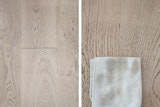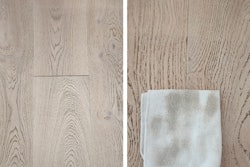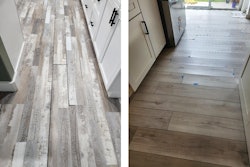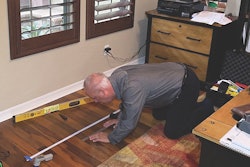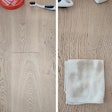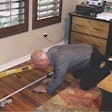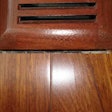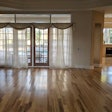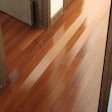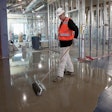A wood flooring inspection is supposed to be a service to the industry-a process that figures out why things went wrong when a floor fails and fairly determines who is responsible. Unfortunately, too often that isn't how things turn out. While I do think that, in general, inspections in our industry are improving (more on that later), wood flooring contractors should be aware of how to prepare themselves for an inspection should a job come to that. I'm both a wood flooring contractor and an inspector, so I've been on both sides of the issue. Here are some things I see going on with inspections and ideas for contractors to help protect themselves.
Common Problems
When an inspection happens, the cause of the complaint is really what's at issue. The inspector's job is to impartially find the cause of the failure and report on his or her findings so the issue can be resolved. That sounds straightforward, doesn't it? But there are several common reasons why it doesn't always happen.
One is because there are inspectors often referred to as "guns for hire" who will assign blame for a job wherever they are told. Oftentimes people think these guns are hired by manufacturers to get out of responsibility for a job, but the truth is manufacturers run into plenty of problems with inspectors, too. A friend who works at a big flooring manufacturer recently told me about a floor failure in which the inspector said that because the installer followed all the instructions from the manufacturer, the cupping on a floor glued direct to a slab was the manufacturer's fault. The inspector didn't do any destructive testing or testing of the flooring at multiple depths to determine if there was a moisture imbalance in the flooring that may be caused by moisture from below.
RELATED: Inspectors: the Good, the Bad and the Ugly
Other times we see inspectors going in and very creatively finding something wrong with the floor-it's almost like they are wanting to interject themselves into the equation to show how smart they are instead of determining the problem and getting out of the way. Sometimes they seem to look for anything that doesn't conform to industry standards, and they will cite that in the report, even when it has nothing to do with the problem. A classic example that seems to come up a lot is blaming the flooring contractor for problems with the nailing schedule when the floor is cupping or has a finish problem. If the inspector finds things wrong with the floor that have nothing to do with the problem, they should not be in the inspection report.
Protect Yourself
As a contractor, you have to be prepared on every job as if you are going to endure an inspection. Use a job site checklist (make your own or use the template available from the NWFA) to record your steps on the job. Record which exact products you use and make sure that all the products are compatible with the manufacturer's guidelines. Have all your data recorded for every job and take photos throughout the course of the job. Data you should be collecting includes subfloor moisture testing, RH and temperature of the job site, and wood flooring moisture content. If you end up being inspected, cooperate with the inspector and give him or her all your data.
Always be sure you are present when the inspection takes place. Watch what the inspector does so that when things are written on the report, you know if they actually happened or not. I know of a contractor with a job on which the inspector literally took hundreds of photos of his inspection. When the report came back, the inspector wrote about moisture readings taken with a certain moisture meter, and those readings were the only damning evidence he had on the job. The contractor had followed the inspector around during every second of the inspection process and had never seen the inspector with that meter, and the inspector couldn't produce a single photo among the hundreds to show he had actually done what he claimed. Lesson learned: Along with being present, taking video of the entire inspection isn't a bad idea-it's something our company plans to do from now on if we have jobs inspected.
I also think one of the most beneficial opportunities out there is to attend the NWFACP Symposium or an NWFACP inspections school. Even if you are solely a contractor and have no interest in being a practicing inspector, learn what this process is about, because it directly affects your livelihood. Avail yourself of the opportunity to familiarize yourself with how things are supposed to be done so you can better defend yourself if things go wrong (and as a contractor, right or wrong, you will end up having your floors inspected).
Finally, know that anyone involved on a job being inspected, from the manufacturer to the contractor to the homeowner, has the right to hire his or her own inspector. If you need to hire an inspector, ask around for references and find one that is certified by the NWFACP. Of course, no certification is a guarantee, but an inspector trained specifically by our industry is your best bet. As the inspection review process (led by Jon Namba, the NWFACP chairman of the Review Committee) has gotten more rigorous for NWFACP inspectors, I've seen the quality of recent inspections improve by leaps and bounds.










